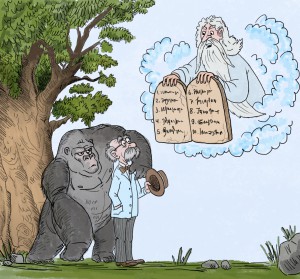In my previous posts on the subject it was repeated several times over what I knew about morality from cultural studies, particularly from a philosopher Vladimir Bibler. We need to distinguish between morality as such and something which cannot be translated in English exactly, something pertaining to ethics, morals, conscience. Let it be conscience.

By Olga Gessen
nervalis@gmail.com
Morality vs. Conscience
Philosophy
The difference is that morality as such is a code to follow, a set of rules, formal and stringent, a recipe for a “right” behaviour of some kind. Conscience, on the contrary, pertains to the personal choice which cannot be determined by rules.
One can argue that our choices are based on rules. Say, there is a commandment “You shall not kill.” Let call it a rule. Follow it and your conscience will not bother you. But what if following the rule is not possible? Say, you either must kill a killer or allow killing? What if two rules contradict one another? Say, you have to steal or let somebody die from starvation or disease? What if there is no rule fit the situation, not at all? What if following a rule just doesn’t seem right? Finally, what if you do not realize what rule is applicable here and now even if there is a rule out there, objectively? All these situations demand personal decision and personal responsibility. All of them challenge your conscience.
Arts
Those situations were explored in many books, plays and movies. And somehow we always sympathize with the “right” choice of a hero but that rarely coincides with following a rule. Or it does when the following is ultimately difficult, dangerous, challenging. How do we know what is right and wrong in such situations? The answer is: Somehow. More specifically, just a bit? We feel somehow which choice is more human, more honourable, honest, decent, etc. That’s it. It justifies itself and doesn’t require or even tolerate any outside reason or cause for itself. We just adore a hero capable of heroic conduct and, maybe, even try to follow it, turning the hero into a role model and her conduct into another code.
The Third Area?
Feelings
Now. It appears that there is yet another, the third area in human conduct which pertains to morality. Something like “humane feelings.” Those are sympathy, empathy, altruism, compassion, etc. They seem to relate to morality but neither to following codes, nor to hard choices of conscience. What are they? Is there any relationship between the feelings and two others, morality as such and conscience?
I believe there is. I think feelings are just the other aspect, other side of any human action. Whether you follow a rule or make a choice, feelings are involved. All kinds of them. Actually, only totally automated act doesn’t involve feelings. But, as soon as an obstacle happens in the way of automated, habitual action, a requirement to overcome the obstacle and thus to make some choice invokes feelings.
And the next question will be where the feelings and a conduct based on them come from? Altruism, compassion, consolation… Let me remind you, dear reader, how all this started. There is a trend to explain those by “positive science.” Human feelings within this approach are forms of animal-like “adaptive” behaviour. I’ve met some proponents of the idea, that’s it.
On Adaptation
OK, there are some forms of chimps’ behaviour discovered there, some in experimental situations, some in natural environment that we can interpret as altruism, compassion, etc. They are. And those forms, probably, were generated in the course of evolution as means to adapt in a group life. Perhaps.
The thing is that humans do not adapt the way animals do. Humans invent tools, develop speech, relationship, skills, arts, etc. all that in relation to say some new activity. In general, every time when an animals have nothing to do but to adapt to changed circumstances humans reinvent themselves so that they could overcome circumstances. Moreover, when humans live in stable conditions and objectively have no need to change anything they still do. They do the same: create new things, tools, develop speech, relationship, etc. That is, humans break out of environment they had adapted to constantly.
Images of Culture
So much for the adaptation. Let’s turn back to “moral feelings.” Say “compassion.” What or better say “Who” you are thinking first of when you hear “compassion?” I believe, that will be Jesus. An image of culture representing the ultimate compassion. There are, of course, others out there. And there are other images representing other “moral feelings.” Self-sacrifice in the name of humanity? Prometheus. Courage in the name of truth? Giordano Bruno. I actually mentioned the role of a cultural hero in this respect in the very beginning. This is how the human feelings are created, spread, get personally adopted . . . and become personal feelings. They all get created against adaptation, they are just the opposite.
Conclusion
So, in the end, who we humans must thank for our morality? The answer is: ourselves.
